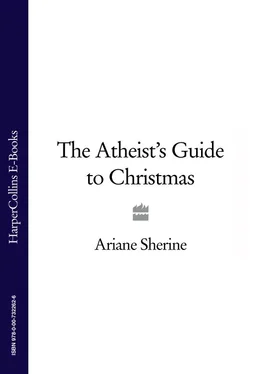The card to God (complete with made-up address 110 Love Street) said, ‘Well done, you must be very proud.’ The card to the Devil (who of course lived at 110 Hate Street) said, ‘Please try to have a good time, in spite of everything.’ I guess I thought he might be feeling blue or left out on the birthday of his archnemesis.
But I think I could relate more to the Devil, and could associate more with his underdog status of everyone hating him. I was chucked out of ballet at the age of four for being disruptive, so I think that the Devil and I both knew what it was like to be excluded from things—the eternal paradise for rebelling against the supreme being; I, a ballet class, for finding it hilarious to say ‘no’ instead of ‘yes’ when the register was called.
I didn’t expect the Devil to write back. Everybody knows he’s a bad boy. But God didn’t write back either, and he had no excuse. I’d heard the phrases ‘Ask and you shall be given’ and ‘Seek and ye shall find’, but I had scientific evidence that Father Christmas was more communicative than either of them. I’d seen that he’d eaten the mince pies I’d left out for him, but when I’d asked God if I could become a mermaid, my legs had stayed resolutely in place.
However, I decided it was understandable that God was far busier than Father Christmas. After all, while they were both very old and had to keep their long white beards in shape, God had to work 365 days a year (except for Sundays), while Father Christmas only worked for one night, and he also only had to help children, not adults, leaving him more time to stuff his face with mince pies. I guess Father Christmas just had a better union.
I think I partly wanted to become a mermaid because of the Biblical story of Noah’s Ark—if it happened again, at least I’d be able to swim away. I had always been a bit worried about this story from an animal rights perspective: the other children enjoyed the bit where the animals went in two by two, but I felt sorry for those who hadn’t made it on to the ark. For them, it must have been like an animal-based Titanic . My one consolation was the fact that all the sea creatures (including dolphins and sea horses) would have survived.
I officially called myself an atheist from the age of ten. I was the only atheist in my class, but the other kids and I did agree on one thing: I wasn’t going to heaven. (Though my reasoning was that you couldn’t go somewhere that didn’t exist.)
I had one ally in our physics teacher (who was an atheist, even though it was a C of E school). He told us the various things humans have believed about the world, from it being flat, to the sun going round the earth, and also told us about the various scientists who had been killed or imprisoned for making new discoveries that went against the doctrine of the church at the time.
He also made a joke which delighted me. Gesturing at the white-board he said, ‘People used to believe that heaven was up here, earth was in the middle, flat, and hell was down there below earth. Which of course we now know can’t be true, because hot air rises, and all the people in heaven would have got burned.’
This teacher said that science was like a box, and that we could never open its lid. We could, however, investigate in other ways: we could conduct experiments and try to recreate events to get the same results. So we could build an identical box, the same weight and size, and say, ‘I have discovered what is in the box’; but then, if the first box suddenly turned green, but our box didn’t, we would have to conclude, ‘Okay, I was wrong’, and start again to try to make our own box go green. In this way science was always learning, changing and expanding, but admitted to not being absolute.
When I heard that the money from this book was going to go to the HIV charity Terrence Higgins Trust, I was really glad it was going to such a fantastic and worthwhile cause. And it seems appropriate that money raised from a book by atheists is going towards humans helping humans, in both a literal and practical sense.
December is historically a time when humans have a festival to cheer them up because the sun has gone, and Christmas holds the current title. Christmas has done well, to its credit. It’s beaten off the competition and is the reigning champion.
There’s also a lot to be said for Christmas. The high spirits, good food and bringing people together are excellent things for humans. Although anyone who says it is the greatest story ever told clearly hasn’t read Watchmen .
Now I am an adult, I can look back on the things that used to make me feel confused, alienated and excluded as an atheist, and take the positives. And, in retrospect, sending a Christmas card to the Devil is ironically possibly the most Christian thing you can do—what with all those parables about turning the other cheek.
So my advice to anyone wanting to celebrate an atheist Christmas would be: imagine there’s no heaven, then try to have a good time in spite of everything.
Losing My Faith
SIMON LE BON
I love Christmas. I always have, ever since I was a child. Back then, Christmas was all about the Baby Jesus—my parents encouraged belief in him. But even if they hadn’t, church and school—which were both C of E—would have greatly influenced my beliefs.
School was very Christian. At Christmas, we had nativity plays, but I never got a leading role in them. I think I was a sheep! I always thought I was destined for great things there, but I never achieved them.
However, though I was Christian and believed in Jesus, I remember that at school there were these fascinating children who were excused assembly. They didn’t have to attend, and for a long time I thought this was because they were atheists. It was only later that I realised this was because they were Jewish, or Muslim, or Hindu.
I was fascinated by the fact that they were allowed to stay out—I would have loved to. While everybody was in assembly, you could have wandered around the whole school by yourself without anybody watching you. That was my fantasy—to get up to mischief in the back of the art room!
I had a lot of faith at one time. I was tempted to go to church as a child, because they told me you earned a shilling every week for singing in the choir. I thought, ‘Mm, wages!’ and became a choirboy.
When you’re in a church choir, you actually go to church about five times over Christmas. You go twice on Christmas Eve, and sing three times on Christmas Day, if you’re doing Matins, the Communion Service and Evensong. So that’s potentially five professional engagements for a shilling a week over Christmas. The music and the choir were very important to me, and they gave me this feeling of godliness, which I really liked—and I prayed.
But I don’t miss that feeling—when it went, it went. It was like somebody pulled the plug out of the bath and the water went down. It didn’t feel good while it was going down, but by the time it had gone you’d got used to your bodyweight, got out of the bath and got on with something else. That’s kind of how it was.
Losing my faith was very gradual. I was confirmed, and I absolutely 100% believed in the Christian God. And then, after a while, it started to change. I started losing my faith when I started trying to figure out what God was: ‘He can’t really look like us! This whole thing about “Man created God in his own image”…’
When it came to working out what I really believed in, I realised that, if there is a God, he doesn’t have a personality. He certainly doesn’t have a set of morals—certainly not human morals, which we impose. And then I started thinking, ‘Well, what if it’s just people trying to personify life? To personify the fact that there is matter, and that there is a universe? If there is a God, that’s it. God doesn’t have a brain, God doesn’t think, God is just existence.’
Читать дальше












